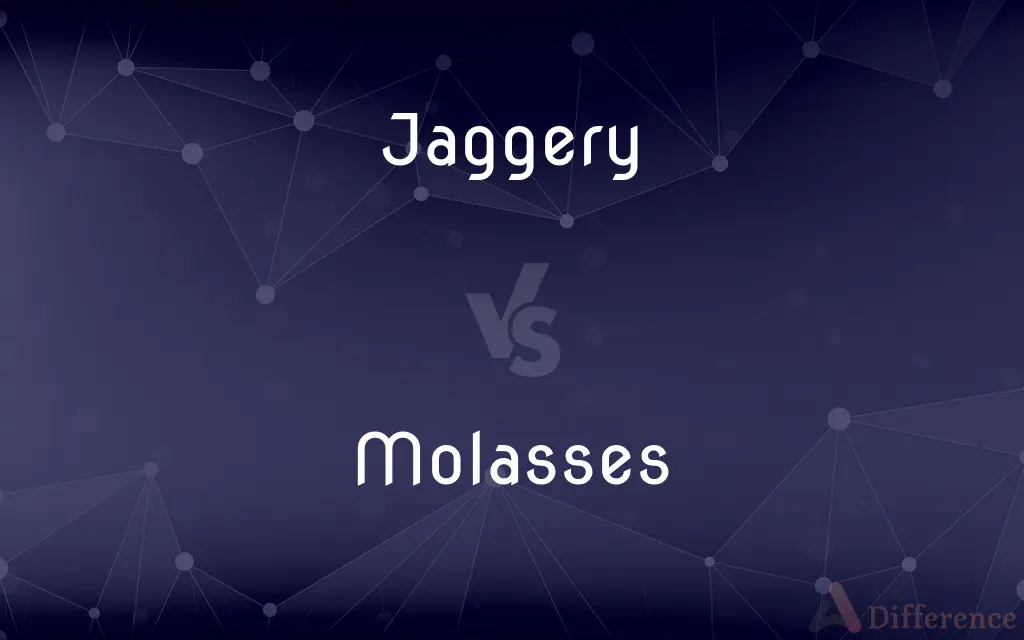Jaggery vs. Molasses — What's the Difference?
By Tayyaba Rehman & Maham Liaqat — Updated on March 10, 2024
Jaggery is a traditional, unrefined sugar made from cane juice or palm sap, while molasses is a byproduct of sugar refining, dark and syrupy.

Difference Between Jaggery and Molasses
Table of Contents
ADVERTISEMENT
Key Differences
Jaggery is produced by boiling down sugarcane juice or palm sap without separating the molasses and crystals, resulting in a solid block or granules. It retains many vitamins and minerals. Whereas, molasses is the syrup left over after sugar crystals are extracted from sugarcane juice, rich in certain nutrients but distinct in its production process.
The flavor of jaggery is rich and varies slightly depending on its source; it can have notes of caramel, molasses, and a slight tanginess. On the other hand, molasses has a deeper, bittersweet flavor that is more intense and less sweet compared to jaggery.
Jaggery is often used in traditional dishes in South Asia and Africa, both as a sweetener and a flavor enhancer. It is considered healthier than refined sugar due to its mineral content. Whereas, molasses is used globally in baking, in marinades, and to produce rum, known for its robust flavor and nutrient content, including iron, calcium, and magnesium.
In terms of texture, jaggery can range from soft and pasty to hard and granular, making it versatile for different culinary uses. Molasses, being a thick syrup, is suited for liquid-based recipes and adds moisture to baked goods.
Jaggery and molasses both offer health benefits due to their nutrient profiles but should be consumed in moderation because of their high sugar content. However, jaggery is often touted for its digestive health benefits, while molasses is recognized for its iron content beneficial for those with iron deficiency.
ADVERTISEMENT
Comparison Chart
Source
Sugarcane juice or palm sap
Byproduct of sugar refining
Form
Solid block or granules
Thick syrup
Flavor
Caramel-like, sweet
Bittersweet, intense
Nutritional Value
Retains minerals and vitamins
Rich in iron, calcium, magnesium
Culinary Uses
Sweetening, flavoring in traditional dishes
Baking, marinades, rum production
Compare with Definitions
Jaggery
Solid or granular natural sweetener rich in minerals.
Jaggery can be grated over desserts for an extra hint of sweetness.
Molasses
Integral in the production of rum.
The distillation of molasses is a critical step in rum-making.
Jaggery
A traditional unrefined sugar made from concentrated sugarcane juice or palm sap.
Jaggery is commonly used in Indian sweets for its rich flavor.
Molasses
A dark, thick byproduct of the sugar refining process.
Molasses is a key ingredient in gingerbread cookies.
Jaggery
A healthier alternative to refined sugar, with digestive benefits.
Many people add jaggery to their tea for its health benefits.
Molasses
Used globally in baking and as a flavor enhancer.
Molasses adds a unique depth to marinades and sauces.
Jaggery
Used in traditional medicine for its purported healing properties.
Jaggery is believed to aid in digestion and detoxify the body.
Molasses
Adds moisture and bittersweet flavor to baked goods.
Molasses is used in recipes to create moist and flavorful cakes.
Jaggery
A versatile ingredient in cooking and baking.
Jaggery is used in making traditional chutneys and sweets.
Molasses
Rich in nutrients like iron, calcium, and magnesium.
Molasses is often recommended for its iron content.
Jaggery
Jaggery is a traditional non-centrifugal cane sugar consumed in the Indian Subcontinent and Southeast Asia. It is a concentrated product of cane juice and often date or palm sap without separation of the molasses and crystals, and can vary from golden brown to dark brown in colour.
Molasses
Molasses () or black treacle (British English) is a viscous substance resulting from refining sugarcane or sugar beets into sugar. Molasses varies by the amount of sugar, method of extraction, and age of plant.
Jaggery
Unrefined sugar made from the sap of palm trees or sugarcane.
Molasses
A thick syrup produced in refining raw sugar and ranging from light to dark brown in color.
Jaggery
A traditional dark-brown unrefined sugar made from palm tree sap which is used throughout South and Southeast Asia; (by extension) other types of unrefined sugar.
Molasses
Any of various thick syrups made from juice extracted from the fruits or stalks of certain plants
Pomegranate molasses.
Jaggery
(by extension) A small-scale production plant that processes sugar cane to make sugar.
Molasses
A thick, sweet syrup drained from sugarcane, especially (North America) the still thicker and sweeter syrup produced by boiling down raw molasses.
Jaggery
Raw palm sugar, made in the East Indies by evaporating the fresh juice of several kinds of palm trees, but specifically those of the palmyra (Borassus flabelliformis) and jaggery palm (Caryota urens).
Molasses
(US) Any similarly thick and sweet syrup produced by boiling down fruit juices, tree saps, etc., especially concentrated maple syrup.
Jaggery
Unrefined brown sugar made from palm sap
Molasses
(figurative) Anything considered figuratively sweet, especially sweet words.
He really poured on the molasses, charming his audience and changing more than a few votes.
Molasses
Plural of molass: whiskey made from molasses.
Molasses
Synonym of molass: whiskey made from molasses.
Molasses
(geology) molasse
Molasses
(obsolete) molass: becomes drunk from molass.
Molasses
The thick, brown or dark colored, viscid, uncrystallizable sirup which drains from sugar, in the process of manufacture; any thick, viscid, sweet sirup made from vegetable juice or sap, as of the sorghum or maple. See Treacle.
Molasses
Thick dark syrup produced by boiling down juice from sugar cane; especially during sugar refining
Common Curiosities
Why is jaggery considered good for digestion?
Jaggery has been traditionally used to aid digestion, possibly due to its mineral content and less refined nature.
Can molasses help with iron deficiency?
Yes, blackstrap molasses is particularly high in iron and can contribute to dietary iron intake.
Which is healthier, jaggery or molasses?
Both have health benefits due to their mineral content, but moderation is key due to their high sugar content.
What is the main difference between jaggery and molasses?
Jaggery is an unrefined sugar product, while molasses is a byproduct of the sugar refining process.
What type of recipes benefit most from the addition of molasses?
Baking recipes, marinades, and sauces benefit from molasses due to its moisture and flavor.
What makes molasses bitter?
The bitterness comes from the concentration of certain minerals and the presence of sulfates in some varieties.
Can molasses expire?
While it has a long shelf life, molasses can degrade in quality over time, so it's best used within a year.
Can jaggery and molasses be used interchangeably in recipes?
While they can sometimes be substituted for one another, their distinct textures and flavors may affect the outcome of a recipe.
How should jaggery be stored to maintain its quality?
It should be stored in an airtight container in a cool, dry place to prevent hardening.
Is jaggery a good alternative to refined sugar?
Yes, due to its mineral content and less processed nature, it's considered a healthier alternative.
How is molasses produced?
Molasses is produced during the sugar refining process, as the syrup left over after sugar crystals are extracted.
Are there different types of jaggery?
Yes, based on the source, there's sugarcane jaggery and palm jaggery, each with its unique flavor.
What are some common uses of jaggery in cooking?
It's used in sweets, teas, and as a flavor enhancer in various traditional dishes.
What is blackstrap molasses, and how is it different?
Blackstrap molasses is the darkest and most concentrated form, rich in nutrients but more bitter than regular molasses.
Is jaggery vegan?
Yes, jaggery is plant-based and considered vegan.
Share Your Discovery

Previous Comparison
Great vs. Nice
Next Comparison
Mopped vs. MopedAuthor Spotlight
Written by
Tayyaba RehmanTayyaba Rehman is a distinguished writer, currently serving as a primary contributor to askdifference.com. As a researcher in semantics and etymology, Tayyaba's passion for the complexity of languages and their distinctions has found a perfect home on the platform. Tayyaba delves into the intricacies of language, distinguishing between commonly confused words and phrases, thereby providing clarity for readers worldwide.
Co-written by
Maham Liaqat















































